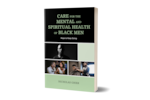Nicholas Grier always come back to the importance of flourishing.
In his work as a speaker, counselor, and community leader, he focuses on self-awareness, resistance, healing, and liberation. Grier is an associate professor of practical theology, spiritual care, and counseling at Claremont School of Theology and a counselor at the Bishop Wellness Center, both . He’s also a member of the Oregon Department of Education’s African American/Black Student Success Advisory Group.
In his book Care for the Mental and Spiritual Health of Black Men: Hope to Keep Going, Grier dives deep into the challenges Black men face in America today: racialized trauma, sexism, homophobia and classism. He writes about how most theories of care and counseling have been developed for white people and fail to address Black men’s challenges. But with his background as a therapist and minister, he’s looking to do more than diagnose a societal problem: he writes that the goal is to help Black men survive, become liberated, heal, and ultimately flourish.
Grier recently talked with OPB’s John Notarianni about the book and his work.

Nicholas Grier
Courtesy of Helena Brantley
John Notarianni: We often talk about injustice as a system that limits people’s external opportunities in life — things like access to jobs and housing or health care; or maybe about the threats that it creates, like potentially facing a greater risk of being subjected to police violence. But in this book, you’re really focused on how injustice operates internally.
Nicholas Grier: Sure, it’s very important to take seriously the internal experiences of Black men. One of the things that I think is unique about what I’m arguing in my book is that we need to care deeply for communal experiences as well as internal experiences. In other words, if I am a Black man and in a community environment that does not nurture my well-being, well, I’m not going to survive, right? And at the same time, we need to care very seriously for the internal emotional experiences of Black men.
Notarianni: One of the interesting distinctions that you draw throughout this book is between what it means to survive and what it means to flourish. I’m wondering if you could tell me a bit more about how those concepts are related for you, and the ways that they’re different.
Grier: Well, for instance, I often think as a Black man myself, that I’m so fortunate to be living, right? There are a number of Black men who did not have the opportunity to have a conversation in this setting; they did not survive. So, before we can even talk about flourishing, we need to take very seriously being intentional about caring deeply for the experiences of Black men, so that we can actually survive and then have opportunities to flourish.
One of the things I think about in terms of flourishing is that Black folks should not be relegated to an existence tied only to suffering and resisting that suffering, right? We need to always have the ability to resist suffering, but hey, you know, Black folks also deserve to flourish.
Notarianni: This book is based on conversations that you had with five Black men between the ages of 25 and 40 years old in Chicago. You say one thing that kept coming up in those conversations was that these men kept talking about how much they wanted to feel “known.” What did you hear from them on that topic?
Grier: I found it very fascinating that a lot of times, they would say something and they would end it by saying, “You feel me?” One of the things I say in the book is that, perhaps, one of the reasons why this is such a common phrase is that people are not feeling life as Black men feel it, right? If a person is not known, especially a Black man, they’re having to always work their way into being seen as a human. And that can be very exhausting. This is why I can think about some of my experiences — even though I’m a professor, I’ve got a PhD, I mean, the list can go on and on — but that doesn’t take away the fact that I’m a Black man and people see me first as a Black man before anything else.

"Care for the Mental and Spiritual Health of Black Men: Hope to Keep Going" by Nicholas Grier
Courtesy of Helena Brantley
Notarianni: How does this approach play out in your work and what you’re doing at Willamette University, both as an assistant professor and as a counselor in the wellness center?
Grier: One of the things that I find very fascinating about this conversation about critical race theory is that when people are arguing against critical race theory — OK, that’s their approach. But one of the things that I see in the work that I do, doing counseling with people in clinical practice, is I see the ways in which people of color suffer emotionally in that setting. So, while folks are having debates saying, “Oh no, we don’t want critical race theory,” I’m seeing in clinical practice the ways in which people of color are suffering and hurting because of these systemic issues that critical race theory is talking about.
I believe that if more people were therapists, and heard and felt the experiences of people in general and also people of color, then we might actually act and lead in a way that resonates deeply with how people experience life.
Notarianni: You grew up in Atlanta, a place that has a really vibrant Black community, and you’ve done research and worked and lived in plenty of other places around the country. I’m wondering what sort of models you see that might be useful for us to understand here in the Pacific Northwest, where really we have a history of exclusionary laws preventing Black people from living here in this part of the country. What have you seen elsewhere that might help here in Oregon?
Grier: It’s interesting, because I absolutely love being a resident here in Oregon. I feel like it’s one of the most beautiful places I’ve ever lived. Even as I experienced that beauty, I reflect on some of this history that you talk about. One of the things that I realized was that there’s not as much of a critical mass of Black people here in Oregon. For instance, with the Oregon Department of Education committee that I serve on, one of the things that we all often mention is that we’re the only one — we’re the only one raising these perspectives many times because there’s no one else in many of these environments that are actually experiencing life the way that we experience it as Black people.
When I was in Atlanta there was the experience of historically Black colleges, where it was a spirit of Black excellence, right? It was expected that that you could be this and that. In fact, you were reminded who you were, and reminded of the contributions of Africans, and reminded of the contributions of African Americans throughout history. I think that experience was something that made me believe that I can be anything that I wanted to be.
I think that perhaps one of the opportunities here in Oregon is to nurture cultures and spaces where the whole state, but especially Black people, have models of Black people who are contributing well to society, and Black people in leadership, and Black people who demonstrate a way to do the things that I’m naming in the book, in terms of certainly surviving, but ultimately flourishing.
Listen to Nicholas Grier’s conversation with OPB Weekend Edition host Notarianni using the audio player at the top of this article.
